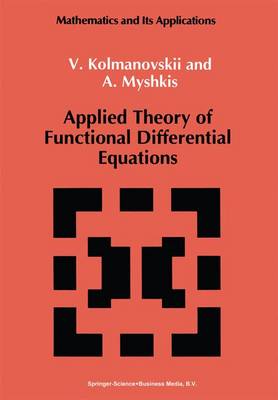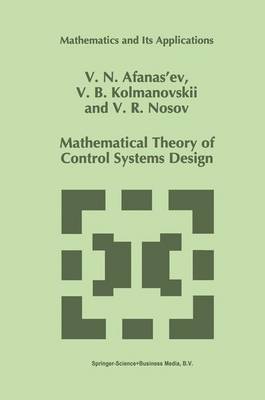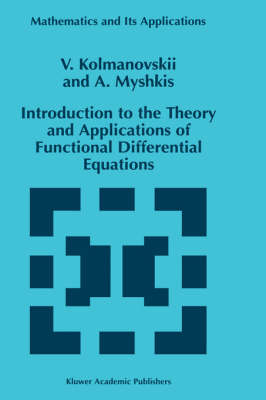Mathematics and Its Applications
3 primary works
Book 85
Applied Theory of Functional Differential Equations
by V. Kolmanovskii and A. Myshkis
Published 30 November 1992
'E.t moi, .. " si j'avait su comment en revenir, One service mathematics has rendered the human race. It has put common sense back je n'y serais point aile.' Jules Verne where it belongs, on the topmost shelf nex t to the dusty canister labelled 'discarded non- The series is divergent; thererore we may be sense'. able to do something with it. Eric T. Bell O. Heaviside Mathematics is a tool for thought. A highly necessary tool in a world where both feedback and non- linearities abound. Similarly, all kinds of parts of mathematics serve as tools for other parts and for other sciences. Applying a simple rewriting rule to the quote on the right above one finds such statements as: 'One service topology has rendered mathematical physics ...'; 'One service logic has rendered com- puter science ...'; 'One service category theory has rendered mathematics ...'. All arguably true. And all statements obtainable this way form part of the raison d'etre of this series.
Book 341
Mathematical Theory of Control Systems Design
by V.N. Afanasiev, V. Kolmanovskii, and V.R. Nosov
Published 31 January 1996
Give, and it shall be given unto you. ST. LUKE, VI, 38. The book is based on several courses of lectures on control theory and appli cations which were delivered by the authors for a number of years at Moscow Electronics and Mathematics University. The book, originally written in Rus sian, was first published by Vysshaya Shkola (Higher School) Publishing House in Moscow in 1989. In preparing a new edition of the book we planned to make only minor changes in the text. However, we soon realized that we like many scholars working in control theory had learned many new things and had had many new insights into control theory and its applications since the book was first published. Therefore, we rewrote the book especially for the English edition. So, this is substantially a new book with many new topics. The book consists of an introduction and four parts. Part One deals with the fundamentals of modern stability theory: general results concerning stability and instability, sufficient conditions for the stability of linear systems, methods for determining the stability or instability of systems of various type, theorems on stability under random disturbances.
Book 463
Introduction to the Theory and Applications of Functional Differential Equations
by V. Kolmanovskii and A. Myshkis
Published 31 January 1999
At the beginning of this century Emil Picard wrote: "Les equations differentielles de la mecanique classique sont telles qu 'il en resulte que le mouvement est determine par la simple connaissance des positions et des vitesses, c 'est-a-dire par l 'etat a un instant donne et a ['instant infiniment voison. Les etats anterieurs n'y intervenant pas, l'heredite y est un vain mot. L 'application de ces equations ou le passe ne se distingue pas de l 'avenir, ou les mouvements sont de nature reversible, sont done inapplicables aux etres vivants". "Nous pouvons rever d'equations fonctionnelles plus compliquees que les equations classiques parce qu 'elles renfermeront en outre des integrates prises entre un temps passe tres eloigne et le temps actuel, qui apporteront la part de l'heredite". (See "La mathematique dans ses rapports avec la physique, Actes du rv* congres international des Mathematiciens, Rome, 1908. ) Many years have passed since this publication. These years have seen substantial progress in many aspects of Functional Differential Equations (FDEs ).
A distinguishing feature of the FDEs under consideration is that the evolution rate of the proc{lsses described by such equations depends on the past history. The discipline of FDEs has grown tremendously, and publication of literature has increased perhaps twofold over publication in the previous decade. Several new scientific journals have been introduced to absorb this increased productivity. These journals reflect the broadening interests of scientists, with ever greater attention being paid to applications.
A distinguishing feature of the FDEs under consideration is that the evolution rate of the proc{lsses described by such equations depends on the past history. The discipline of FDEs has grown tremendously, and publication of literature has increased perhaps twofold over publication in the previous decade. Several new scientific journals have been introduced to absorb this increased productivity. These journals reflect the broadening interests of scientists, with ever greater attention being paid to applications.


